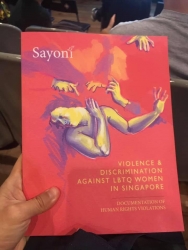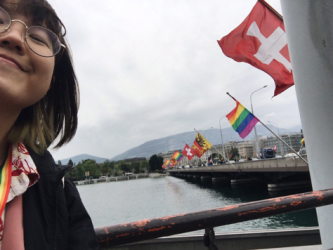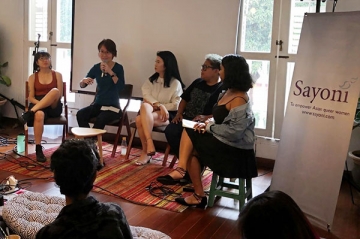He was responding to a question posed by a resident, Ms Khartini Abdul Khalid during a dialogue session when he visited Punggol Central Division yesterday.
While the Government has to “set the standards” on many issues, it must “be careful about being ahead of public opinion,” he said.
“If the majority of our population is against homosexuality, then it’s not for the Government to say we are going to force something against the wishes of the people,” he said, reiterating the Government’s stance when a motion to repeal the law banning homosexual acts in Singapore was intensely debated in Parliament in 2007.
Section 377A – which makes those convicted liable to imprisonment up to two years – was not repealed eventually, even though the Government said it would not actively enforce it.
Mr Shanmugam explained that India’s laws on homosexuality have not changed. Instead, it was the New Delhi High Court’s interpretation that “with the current evidence available and the current social situations in many parts of the world … you can no longer consider homosexuality to be a wrongful sexual activity”, he said.
Mr Shanmugam stressed that Singapore’s courts are likewise free to interpret the law the same way.
“Whether the courts will take the same interpretations, I don’t know, but it’s up to the courts.”
The problem with the government’s reasoning of not wanting to “be ahead” of public opinion is two-fold.
i) Rights should not depend on majoritarian notions – if that were to be the case, then rights for minorities would likely not exist, for surely, the majority profits from oppressing the minorities.
ii) The government’s claim that they cannot be ahead of the people is disingenous – they have taken unpopular action in the past, such as legalising casinos.
To step shy of an action repealing s377A is simply to send the signal that their queer citizens are second-class citizens not worthy of legal protection. It also sends that the religious sensitivities of people can be used to discriminate against people who do not share that view – which is a dangerous path to tread.
s377A is a highly discriminatory piece of legislation which criminalises even consensual sex between men. Its effects go far beyond simply making queer men criminals – it stigmatises homosexuality, adding a layer of non-apprehended criminality to their lives. It greatly impedes work in the HIV/AIDS sector, as the threat of criminal sanction drives the community underground. Criminalising the conduct itself does nothing to curb its practice, but has many other adverse effects.
All of this was acknowledged in the landmark judgment of Naz Foundation v Government of NCT of Delhi WP(C) No.7455/2001 decided last week. The court ruled decisively that there was no rational nexus between the law and its use against homosexual men, hence violating the fundamental right of being equal before the law.
For those unversed with the general doctrinal approaches to equality litigation – equality does not mean actually everyone is treated alike. Equality means treating like alike, and unlike unlike. If there is to be a differential treatment of people, it has to be based on a rational nexus. Different jurisdictions take different approaches to how this rational nexus is evaluated. Hence, for a law to be held as constitutional even thought it treats people differently, the differential treatment has to be based on a reason that makes some sense. For example, one cannot discriminate against red-headed girls for a job, because the colour of her hair has no bearing on how she does her job.
There has also been a certain amount of eye-rolling in certain circles at the fact that India, a country which is supposed to be more socially and economically backwards, a country which can be said to be more conservative than Singapore, has decriminalised homosexuality, throwing the “asian values” argument right out the window. While the sentiment is understandable and quite justified, the reality is that Singapore and India are in different constitutional environments. Rights litigation is active and vibrant in India, and anyone who has studied public law in Singapore realises that local courts often reject precedents on constitutional cases that originate from India (for various reasons too complicated to cover here).
I also find it curious that the law minister seems to be abdicating the decision to the judiciary – an attitude which did not exist in the past. Never has in Singapore history a law been struck down for being unconstitutional – Public Prosecutor v Taw Cheng Kong (High Court) was the closest one got to striking down a law, and that was promptly reversed by the Court of Appeal. Are they leaving it to the courts, confident that the judiciary will not strike down a law made by the legislature (or that a case would ever even come to the court), or are they hoping it will happen and they will not have to be accountable to the people for the courts (staffed by judges who are not democratically elected nor accountable to any electorate, hence immune from their pressure) exercising their inherent jurisdiction and judicial power?
Now that the legislature has official washed their hands off the matter (at least for the time being), should we look to the courts for salvation? This is a tricky question, and can be the subject-matter of an entire thesis, analysing the history of the Singapore rights jurisprudence and how far the courts are willing to push. Constitutional litigation in general has had a very poor track record, as I explained earlier. However, things are changing – we now have a very wise, very learned bench (Chan Sek Keong CJ, Andrew Phang JA, VK Rajah JA) which prizes legality and are slowly but surely opening up to the notion that the courts are indeed the ultimate arbiter of law in the state, even on constitutional issues.
Whether or not now is the time to make this constitutional challenge, it is safe to say that in a few years, it will be (if it is not repealed quietly by the legislature by then).




Comments
July 9, 2009 at 3:49 pm
The Minister appears to be saying that the legislature will respect the court’s decision in the event of a legal challenge. In my opinion this is a good thing and should not be interpreted as washing their hands of the matter. Many thoughtful and well-considered judicial decisions are reversed by knee-jerk reactions from governments concerned about their popularity. The Singapore and Indian legal systems have a common history, which makes it more likely that, in the absence of local precedent, the court will look to India as a relevant jurisdiction. We live in hope, at any rate.
RSS feed for comments to this post